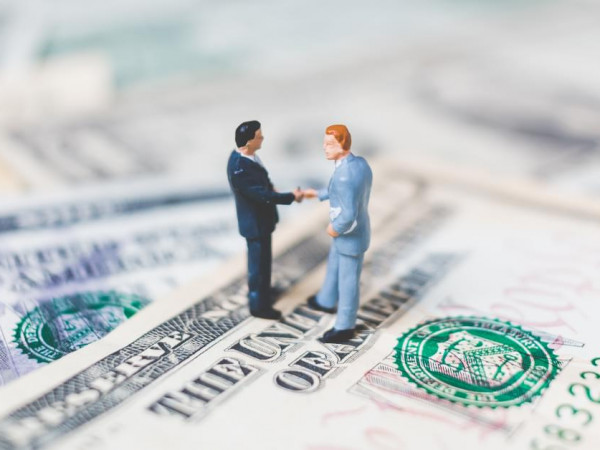
Business, particularly international business, can be extremely complicated when it comes to exchange rates. Not only is it complicated in itself, but the changes in exchange rates can add further difficulty, as business costs and profits will change each year.
By definition, an exchange rate is the difference in price between one currency and another. This will constantly fluctuate, sometimes drastically, which for some businesses can have a huge impact on their profits and demand.
In this article, we will be discussing why exchange rates fluctuate, how exchange rates affect businesses, and how to secure yourself from exchange rate fluctuations.

Why do exchange rates fluctuate?
Exchange rates are determined by a multitude of factors, such as interest rates, inflation rate, speculation and volatility. Political and economic changes are often the root cause of these fluctuations in currency, as the trust and reliability of that currency shifts. For example, one of the strongest currencies in the world is the Pound Sterling, but due to Brexit and all its complications, it dropped in value, as confidence in the country and currency was reduced.
Inflation rate differentials are also an important factor in dictating exchange rates. An inflation rate differential is the difference between one country’s inflation rate compared to another, and can be a huge factor in determining one currency’s strength compared to another.
Currencies will also fluctuate for unknown reasons, as the market is constantly moving and changing.
All these factors determine the relative strength of a currency – which is essentially how much that currency is worth compared to others, and how stable the currency is.
Why do exchange rates affect businesses?
With these comparative fluctuations in currency, international business and trading can be heavily affected. This is because your clients’ currency will be different to your own, so if there is an increase or decrease in relative value, this will affect the costs of your business. If your purchasing power increases, then it will effectively make things cheaper for you, and vice versa.
It’s important to remember that a decrease in the value of your currency (known as currency depreciation) doesn’t necessarily mean that you business will suffer – in many cases, your business will actually benefit.
How exchange rates affect international business depends on what kind of business you have, the severity of the change, and the particular currencies involved.
What happens if your currency depreciates?
When your currency depreciates (meaning that the value of your own currency goes down), the price of imported goods and services rises for you and your business. This means that the imported products and services will be more expensive, which leads to less demand.
However, if your business deals with exports, then this is good news for you, as there will be an increase in demand for your products. Many businesses make a great profit from this, as due to the increased demand they often see increased sales, and are also able to raise their prices to the same value prior to depreciation, meaning that they will be able to maintain their costs, but increase profits.
What happens if your currency appreciates?
Currency appreciation, meaning that your currency increases in value to another currency, means that the price of imported goods and services decreases – the opposite effects of depreciation. This makes imported products cheaper for you. It will also lead to an increase in demand which means successful import companies should see increased profits. Export companies will then have the opposite effect.
Therefore, it is important to understand where the profits of your specific business are coming from and prepare accordingly so you do not lose any unnecessary profits. It also important to be aware of the current risks and volatility in the market, so you can take steps towards minimising your risk.

How to secure yourself from exchange rate fluctuations
There are many ways to secure yourself from volatile exchange rates, and even adapt your business to benefit from the fluctuations.
Limit the number of currencies
One of the most obvious and simple strategies to tackle exchange rate fluctuations is to limit the number of currencies that are being used by your business. If you’re using more than two currencies in your business transactions, this opens you up to losing even more unnecessary cash if you don’t stay on top of all the price movements. If you limit the amount of currencies used, then you will be able to track the rates more easily, and react if there is a change in value.
Use fixed contracts
Using fixed contracts can be another method of security, which means that you will prearrange an exact price for your services or goods, meaning that it will be protected from exchange rate volatility. Using effective forecasting can also be an effective tool to keep track of your business spending and maintain control over the payments you are making.
Protect your company’s exposure
Another method is FX hedging, which is a method of locking in exchange rates for a set period using derivatives, ensuring that you can conduct business without huge fluctuations. This can be very effective, particularly in times of great market volatility. Businesses can also choose how much of their FX exposure to hedge; it can be partial or full, as with fully hedging all your foreign currency in derivatives, you will often expect to see less profits.
Use a reliable FX company
Another way in which your business can be affected by exchange rates is having a poor system of exchanging currency, and therefore losing cash from unnecessary fees. Currency exchange rates can be very costly if you have not picked a good exchange company, or you are using an inefficient method, such as a bank transfer, so it is important that you find the best possible deal that you can.
Using CurrencyTransfer can help you find a significantly cheaper deal on your foreign transaction fees. We help to save businesses money by cutting excessive bank fees and salesmen out of the equation, which sadly many SMEs are paying when they don’t need to be.
Caleb Hinton
Caleb is a writer specialising in financial copy. He has a background in copywriting, banking, digital wallets, and SEO – and enjoys writing in his spare time too, as well as language learning, chess and investing.



